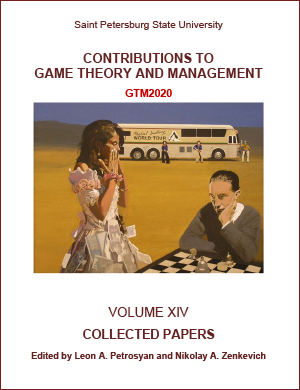Static and Dynamic Game Theoretic Models of Opinion Control in Marketing Networks
DOI:
https://doi.org/10.21638/11701/spbu31.2021.01Abstract
In this paper we consider game theoretic models of control on networks with application to marketing. We suppose that all strong subgroups are determined in the stage of analysis of the influence digraph, and the control impact is exerted only to the members of those subgroups because they determine all stable final opinions. An agent's opinion is interpreted as his expenses for buying goods (services) of a firm. The following problem of opinion control is being studied. A dynamic (difference) game in normal form where the players solve the problem of maximization of the sum of opinions of the members of a target audience by means of the closed-loop strategies of impact to the current opinions of the members of strong subgroups. We received the analytical solutions and conducted their comparative analysis.
Keywords:
games in normal form, models of impact and control on networks, marketing
Downloads
References
Downloads
Published
How to Cite
Issue
Section
License
Articles of "Contributions to Game Theory and Management" are open access distributed under the terms of the License Agreement with Saint Petersburg State University, which permits to the authors unrestricted distribution and self-archiving free of charge.




